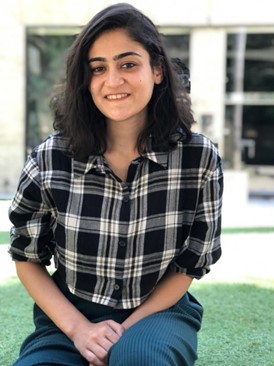From where I stand: “When our documentary won second place, it gave me hope and reassurance that my passion could truly become my career.”
Date:
With her passion for filmmaking, 26-year-old Asmaa Mohamed wanted to enrol in the High Cinema Institute, but unfortunately, she did not pass the entry exam. Still, she didn’t let that stop her from pursuing her dream. Asmaa sought out freelance projects for video and documentary production alongside her full-time job at a marketing agency. In addition, Asmaa worked on developing her skills through self-learning and by enrolling in different training courses and workshops related to the field of her passion, one of which was UN Women’s scriptwriting training, which she came across through a social media announcement.

“I’m always keen to learn different aspects of cinematography. I took many training courses, such as photography, videography and content creation. Although such courses were very expensive, I did not benefit much, as they were mainly focused on theoretical content and lacked practical training that would walk us through real-life applications.
However, when I enrolled in UN Women’s scriptwriting training, free of charge, I was happy to learn that the training offered hands-on experience, which I was eagerly seeking to develop professionally in this field. I believe this is why I’ve outdone myself and succeeded at the end of the training in developing two very well-structured scripts. Following this, I was over the moon to learn that I was among the few distinguished participants selected to take part in a documentary competition organized within the training programme, through which I immensely enriched my experience.
Through participating in the competition, I learned various aspects related to the filmmaking industry [beyond scriptwriting], such as the pre-production process, including setting budgets, issuing shooting permits and casting, in addition to learning more about camera set-up, lighting, directing and editing.
It was such a great moment when our documentary won second place. I was extremely proud that even with limited experience and equipment, we were able to produce an impressive documentary. It gave me hope and reassurance that my passion could truly become my career. I can confidently say that I am now more competent at handling video productions, and I am fully aware of the process and requirements.
One of the most important things I gained through this training is a strong network of professionals and supportive instructors and fellow trainees. We all share training and employment opportunities, and we encourage each other to develop our portfolios and experiment in producing different pieces of content, including films and documentaries. Whenever I face a technical difficulty, I can easily contact any of my peer trainees and she will provide heartfelt advice.
I will continue to create films and documentaries, enhance my writing and filmmaking skills, and learn more about the cinema industry. My dream is to make history in Egyptian cinema and produce a musical film.”
***
The scriptwriting training that Asmaa joined falls within a wider set of trainings on creative industries delivered by Arascope for media production in cooperation with Media-Arts for Development (MADEV) including photography, directing, copywriting, editing and coloring.
The activity comes within the framework of the regional joint programme “Promoting Productive Employment and Decent Work for Women in Egypt, Jordan, and Palestine,” implemented by UN Women and the International Labor Organization (ILO), in partnership with the National Council for Women and the Ministry of Manpower, with the support of the Swedish International Development Agency (Sida).
Through this activity, internship opportunities were offered to 100 distinguished women trainees. In addition, teams of selected 30 trainees took part in a documentary competition, which resulted in the production of three women-led documentaries that focused on societal stories portrayed through women’s eyes. The documentaries have been submitted for participation at the upcoming edition of Aswan International Women Film Festival.
Asmaa’s story shows how the programme helped in providing women with learning opportunities and a strong network to facilitate their career development and reduce the proportion of youth not in employment, education, or training. This directly links to the achievement of SDG 5: Achieve gender equality and empower all women and girls and SDG 8: Promote sustained, inclusive and sustainable economic growth, full and productive employment and decent work for all.